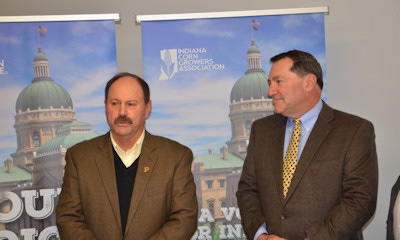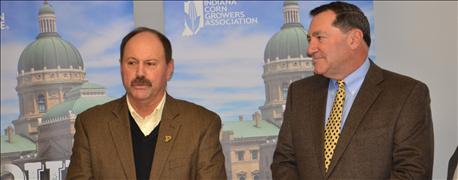
U.S. Senator Joe Donnelly took time to address key ag issues with the media when he was in Indiana recently. Three key issues topped the list- concern about the Waters of the United States situation, the Renewable Fuels standard and the possibility of more trade with Cuba.
Here is what Indiana’s junior senator said about these key topics. Senator Donnelly serves on the Senate Ag Committee.
Media: Ethanol has become a key market for Indiana farmers. What are your thoughts about the Renewable Fuels Standard and the debate on this topic in Congress?

RECEIVES AWARD: The Indiana Soybean Alliance and Indiana Corn Growers Association presented Senator Donnelly, right, with the first Friend of Farmers award. Kevin Wilson, left, is past president of ISA.
Donnelly: Gas prices are down today and we’re becoming more energy independent. When it comes to the renewable Fuel standard, we need to fight for America. Energy dollars which are generated here are dollars that don’t go into someone’s pocket overseas. I will definitely fight for the Renewable Fuels Standard.
Media: There has been lots of talk about increasing trade with Cuba. Where do you stand on increasing trade with Cuba?
Donnelly: This could be a great market for our goods, especially for ag products. There is high demand for pork products down there. Cubans really love their meat products. Of course, Indiana is a large producer of hogs and processor of pork products. It would be a good opportunity to sell these products.
Related: Where WOTUS rule stands today - tied up in court and not yet implemented
The bottom line is that we just want access to markets. This could be another good market for U.S. ag products.
Media: What can you tell us about the Waters of the United States rules that were developed by the Environmental Protection Agency?
Donnelly: Right now the issue is tied up in the courts. EPA published a final rule and intended to implement it, but the court case has delayed any action.
The Congress attempted to stop EPA from implementing this rule with legislation passed by both chambers recently. However, President Obama vetoed the bill. There weren’t enough votes to override his veto at this time.
Media: What is your position on WOTUS?
Donnelly: We are fighting it. No one knows better how to protect the quality of their water and land better than farmers. They live on the land, drink the water and their children also live and play there. Farmers know far better how to take care of their land than a bureaucrat sitting in Washington, D.C. I represent a state where agriculture is part of our heritage. Farmers also know a lot about common sense. I take the wisdom I might have on these issues from the farmers I am in contact with here in Indiana.
Media: What is the next step with WOTUS?
Donnelly: right now it’s up to the courts. However, we continue to watch these developments carefully. And we will continue to keep a close eye on it, and on how the courts decide. We will continue to work within the Senate to see that people understand that nobody except farmers really understand the best way to care for their land.
About the Author(s)
You May Also Like




